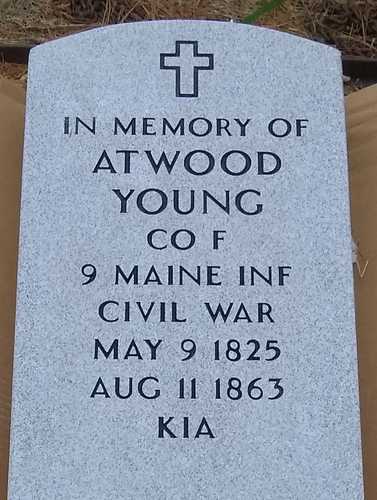Keywords: Gravestones
Item 15582
Gravestone, Eastern Cemetery, Portland, ca. 1900
Contributed by: Maine Historical Society Date: circa 1900 Location: Portland Media: Glass Negative
Item 12394
Ruthe Lyman, 1785, York Village, 1965
Contributed by: Maine Historical Society Date: 1965 Location: York Media: Photographic print
Exhibit
Memorializing Civil War Veterans: Portland & Westbrook
Three cemeteries -- all of which were in Westbrook during the Civil War -- contain headstones of Civil War soldiers. The inscriptions and embellishments on the stones offer insight into sentiments of the eras when the soldiers died.
Exhibit
Most societies have had rituals or times set aside to honor ancestors, those who have died and have paved the way for the living. Memorial Day, the last Monday in May, is the day Americans have set aside for such remembrances.
Site Page
Mount Desert Island: Shaped by Nature - Early Settlement
"Early Settlement Gravestones of John Savage and Sarah Dolliver SavageNortheast Harbor Library The first generation of Savages on Mount Desert…"
Site Page
Presque Isle: The Star City - Thompson's Memorial
"… created memorial works, including headstones and gravestones. After Thompson died in 1912, Frank Barney, his son, became the sole owner of the…"
Story
USCG Boot Camp Experience, Vietnam War era
by Peter S. Morgan, Jr.
"Letters to the Wall" Memorial Day
Story
Civil War Soldier comes home after 158 years
by Jamison McAlister
Civil War Soldier comes home after 158 years
Lesson Plan
What Remains: Learning about Maine Populations through Burial Customs
Grade Level: 6-8
Content Area: English Language Arts, Social Studies, Visual & Performing Arts
This lesson plan will give students an overview of how burial sites and gravestone material culture can assist historians and archaeologists in discovering information about people and migration over time. Students will learn how new scholarship can help to dispel harmful archaeological myths, look into the roles of religion and ethnicity in early Maine and New England immigrant and colonial settlements, and discover how to track changes in population and social values from the 1600s to early 1900s based on gravestone iconography and epitaphs.













